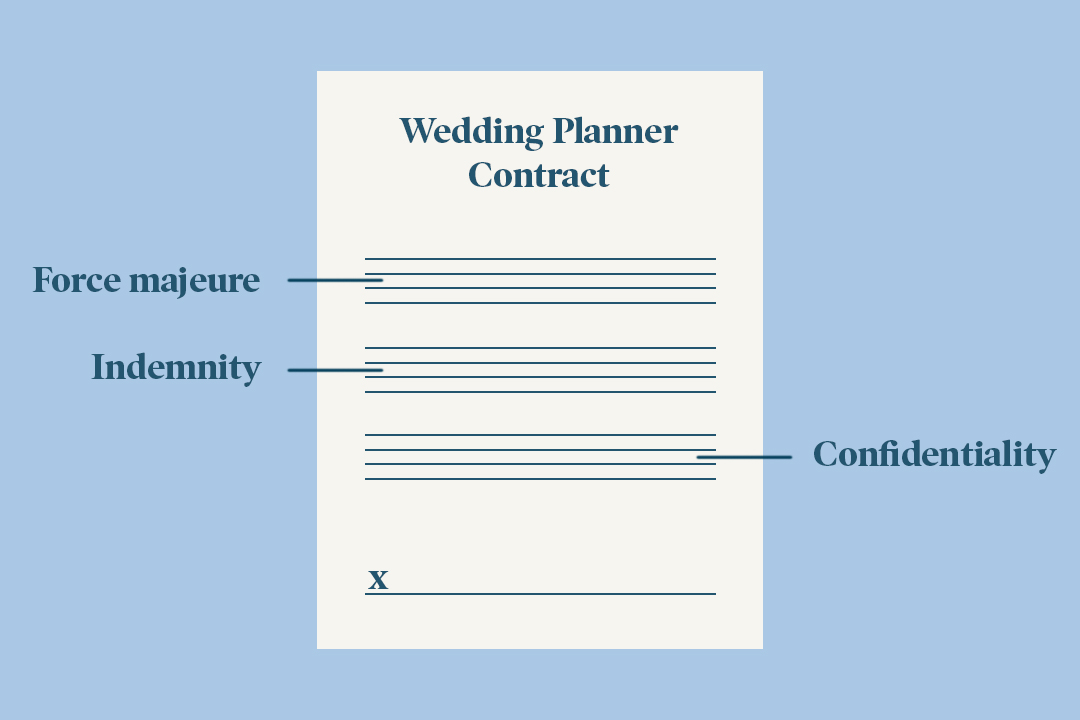- Expert advice/
- Wedding planning 101/
- Legal/
- What to Look For in Wedding Planner Contracts
- Legal
What to Look For in Wedding Planner Contracts
Everything you need to know before signing your wedding planner contract.
Last updated February 5, 2024

A wedding planner can be an extraordinary help to a couple planning for their wedding, but not all wedding planners are created equal! There can be tremendous variation in what exactly counts as the duties and responsibilities of a wedding planner. This is why it is important to sign a contract before you move forward with a wedding planner. The wedding planner contract will ensure that you and your wedding planner are aligned on what to expect on your big day, and that there will be no big surprises along the way.
What Wedding Planner Arrangement Do You Want
There are many different roles for a wedding planner. Some couples choose to book a wedding planner who is hired to oversee the entire event, from finding a wedding vendor to confirming the guest list. This is not the only option, though. A less encompassing arrangement might be with a wedding planner who is hired to oversee the logistics of the wedding day itself, but who is otherwise not actively part of decision making throughout the wedding planning process.
The wedding planner contract is where this information is laid out, and made clear. Before you reach out to wedding planners, it might be helpful to think through what sort of arrangement would best suit your needs, and what aspects of their services you want to ensure are noted in an event planning contract.
What To Look Out For In Wedding Planner Contracts
Before you sign an event planning contract, make sure it includes the following critical pieces of information.
- The time and date of the wedding
- The signature of both partners and the wedding planner.
While some couples might only have one person sign the contract with the wedding planner, it can be helpful to have both partners enter into the agreement, as it might stave off confusion in the event that one partner has to negotiate with the wedding planner independently.
You also want to make sure you can answer some basic questions about how the arrangement will work. These questions should be addressed in the contract:
- What aspects of wedding planning are you and your partner responsible for? - Who is booking the photographer, the music, wedding venues, catering, florist, block of hotel rooms for your guests, and who is confirming with all the wedding vendors a few weeks before?
- Who is responsible for finding a replacement if a vendor unexpectedly cancels?
- How many consultations, follow-ups, and revisions to the plan are included in the arrangement with the wedding planner?
- What happens if you are unsatisfied with the event planner’s services and want to cancel the arrangement before the wedding date?
- What happens if, for some reason, the wedding is canceled?
- Is there an amount of notice time in which you will receive a refund, and if so, how much?
- What is the schedule of payment, and how is the fee structured?
- Are there any services that are not included in the fee, and are noted in the contract as additional charges? (The inclusion of surprise hidden fees is one reason why it is so important to read through any contract very carefully!)
- Will the wedding planner be present at the wedding itself, or only be available by phone? Will he or she send an assistant?
- By when does the contract stipulate that various aspects of the wedding planning will be confirmed? What happens if these deadlines are not met?
The wedding planner might want to include images of your wedding in their own promotional materials. While many people are comfortable with that, you can check the contract to see if this is included, and you can let them know if that is not something you are comfortable with.
Terms To Know
The wedding planner contract will likely include a few legal terms. This guide helps you understand what they mean.
Force majeure
Also known as an ‘act of God’ clause, this is the term for when circumstances prevent the fulfillment of the contract in ways completely beyond the control of either party. The force majeure clause includes natural disasters, fires, or medical emergencies.
‘Indemnity’ and ‘Hold harmless’
This is the clause that stipulates that the wedding planner is not legally responsible for the events of the wedding. If a guest, for example, eats food to which they are allergic, or runs into a glass wall, the wedding planner cannot be sued. Many couples consult with a lawyer to ensure this clause is the right choice for them, and some choose to purchase wedding insurance to cover any potential mishaps on the day.
Confidentiality
This clause is intended to ensure that the wedding planner agrees to keep information about your wedding private, including where it is located and how many guests are arriving.
The decision to hire a wedding planner is the right one for many couples. When booking a wedding planner, however, it is important to make sure you sign—and read—a wedding planning contract stipulates the services provided, the fee to be paid, and the timeline for such services. This guide will give you the information you need to sign your wedding planner contract with confidence.
- Expert advice/
- Wedding planning 101/
- Legal/
- What to Look For in Wedding Planner Contracts
Find even more wedding ideas, inspo, tips, and tricks
We’ve got wedding planning advice on everything from save the dates to wedding cakes.
